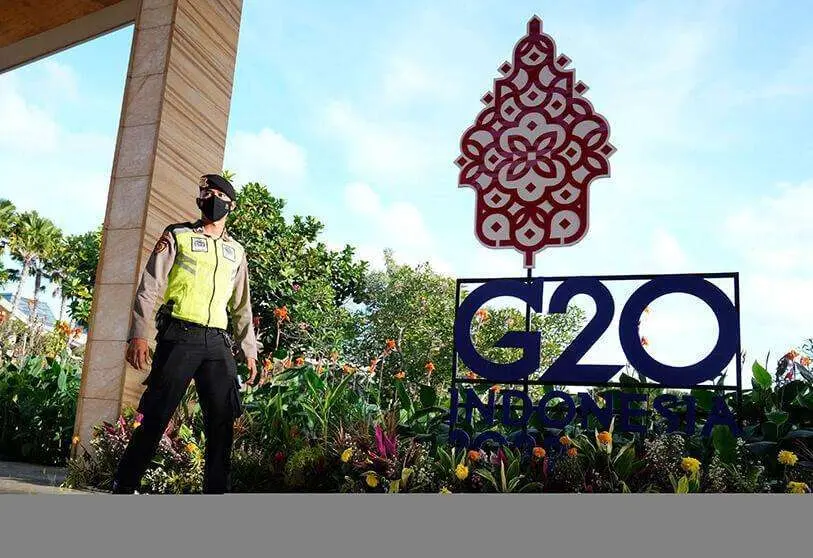G20 leaders increase pressure on Russia to stop invasion

The select club of the world's 20 most powerful economies tightens the diplomatic noose around the Kremlin. The Group of Twenty's final statement, signed by most of the diplomatic delegations present at the Bali summit, "strongly" condemns the actions of Russia, one of its leading members, and demands an immediate end to a war that is causing, it argues, "immense human suffering and exacerbating existing fragilities in the global economy", according to media reports that have had access to the document.
The 16-page draft accuses Russia of having provoked a war that was "constraining growth, increasing inflation, disrupting supply chains, increasing energy and food insecurity, and raising risks to financial stability". The document notes, however, that within the G20 there are "other views and different assessments of the situation and sanctions", especially from Russia, China and the countries of the Global South, which are distanced from the Western view.

The diplomatic delegations agreed on the content of the communiqué on Monday evening after three days of intense negotiations. The final declaration is expected to be issued on Wednesday, during the second day of the summit, in view of the reluctance of Moscow and Beijing, the only two members opposed to it. Consensus on this issue is materially impossible, but the club is close to a majority that would have been unthinkable just a few months ago.
India tipped the balance to secure a statement condemning the Russian invasion, according to the Financial Times. The stance taken by New Delhi has been ambiguous in some cases, and it never went so far as to join the Western bloc's sanctions. However, the Indian delegation finally took into account the statements of its prime minister, Narendra Modi, who told Russian President Vladimir Putin in September that "this is not the time for war".
The international community is thus increasing diplomatic pressure on Russia. Western allies, led by the United States, have sought to place Russia's invasion of Ukraine at the centre of the debate and to extract a majority condemnation of the Kremlin's actions, pushing the motive that usually justifies the annual G20 meetings - the economy - into the background. Putin was aware of this, which is why he declined to attend the summit and instead sent one of his veteran lieutenants, Foreign Minister Sergei Lavrov.

The group that accounts for more than 80% of global GDP, 75 % of international trade and 60 % of the world's population appears to have adopted a joint position. But the collective position is far from homogeneous. Some are in favour of a negotiated solution to the conflict, others set a series of preconditions for ending the war, and others are in favour of maintaining collaboration, the business as usual doctrine. Indonesian President Joko Widodo expressed this view.
"We have no other option, collaboration is necessary to save the world," said the summit host. "We must not divide the world into parts. We must not allow the world to fall into another Cold War." His Chinese counterpart Xi Jinping followed suit, saying that the G20 "must strongly oppose the attempt to politicise food and energy issues or use them as tools and weapons". Xi also advocated the removal of "unilateral" sanctions.
The Ukrainian president appealed via video conference to the leaders of what he called the 'G19', in a clear exclusion of Russia. He was one of the first heads of government to speak, and he did so to put on the table a series of proposals aimed at ending the conflict. Against all expectations, the Russian diplomatic delegation, led by Lavrov, remained in the room and listened to Zelenski's demands, according to witnesses quoted by Reuters.

"The time has come for Russia to withdraw completely from the sovereign territory of Ukraine and I want this war to end fairly, and on the basis of the UN charter and international law," the Ukrainian leader said. For Zelenski, a ceasefire would only be possible if such a scenario is fulfilled, and no peace deals should be offered that compromise Ukraine's "conscience, sovereignty, territory and independence".
Zelensky presented the Kiev government's "peace formula". Full withdrawal of the Russian army, freedom for Ukrainian prisoners of war, economic reparations and, finally, guarantees of food and energy security. These are some of the conditions demanded by the Ukrainian president. Zelenski said that the only alternative would be to freeze the conflict and allow Russia to build up forces to launch a new offensive that, like the previous ones, would generate even more instability on a global scale.








